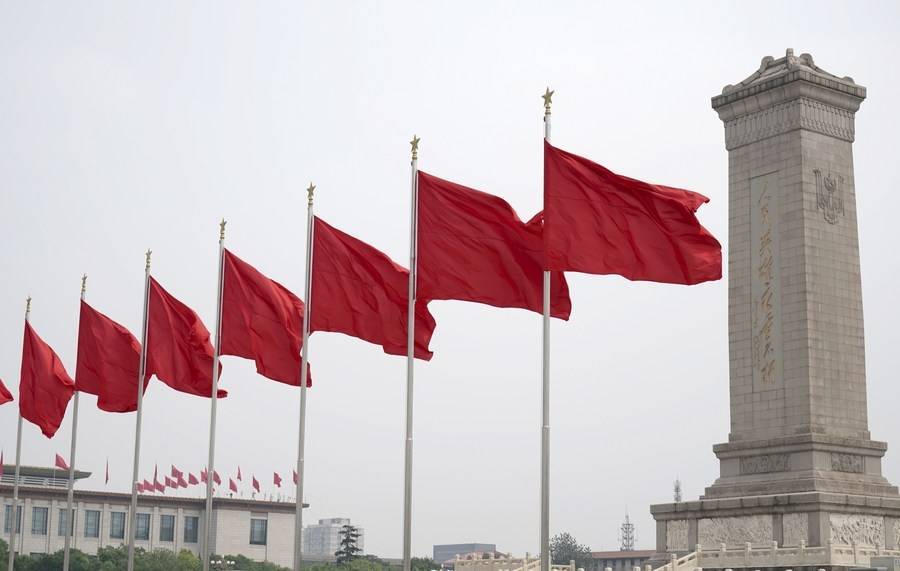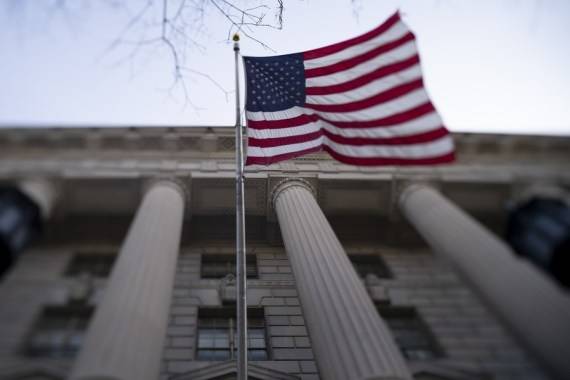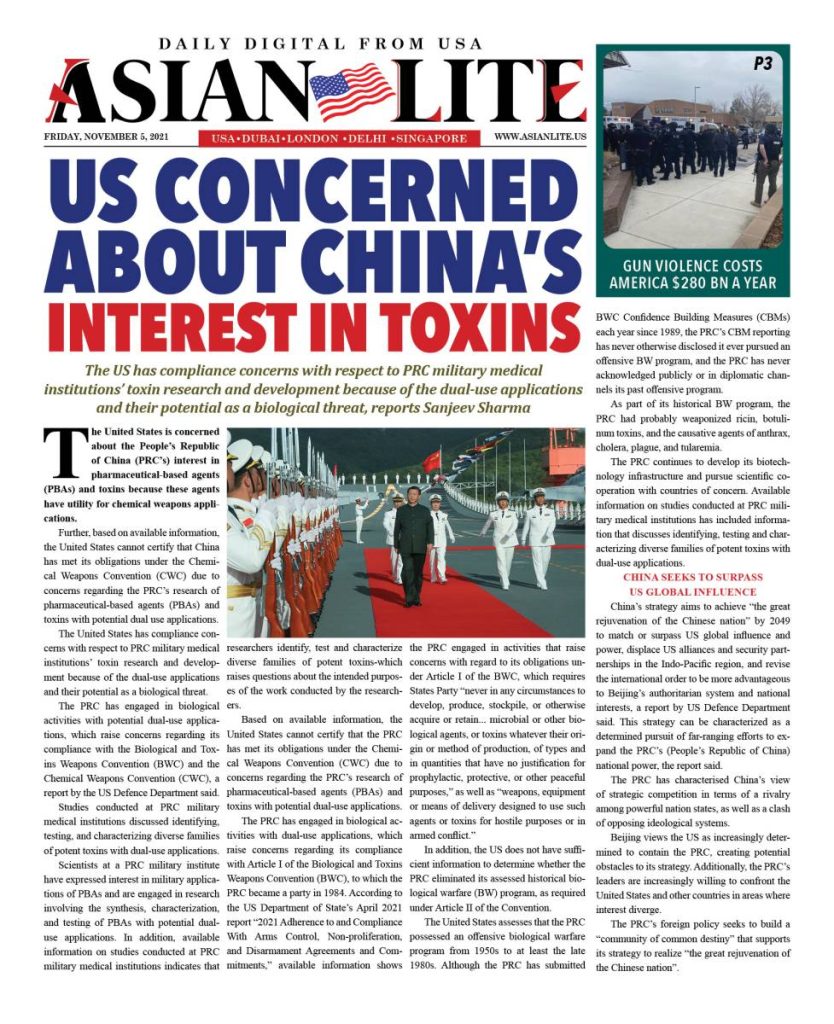The US has compliance concerns with respect to PRC military medical institutions’ toxin research and development because of the dual-use applications and their potential as a biological threat, reports Sanjeev Sharma
The United States is concerned about the People’s Republic of China (PRC’s) interest in pharmaceutical-based agents (PBAs) and toxins because these agents have utility for chemical weapons applications.
Further, based on available information, the United States cannot certify that China has met its obligations under the Chemical Weapons Convention (CWC) due to concerns regarding the PRC’s research of pharmaceutical-based agents (PBAs) and toxins with potential dual use applications.
The United States has compliance concerns with respect to PRC military medical institutions’ toxin research and development because of the dual-use applications and their potential as a biological threat.
The PRC has engaged in biological activities with potential dual-use applications, which raise concerns regarding its compliance with the Biological and Toxins Weapons Convention (BWC) and the Chemical Weapons Convention (CWC), a report by the US Defence Department said.
Studies conducted at PRC military medical institutions discussed identifying, testing, and characterizing diverse families of potent toxins with dual-use applications.
Scientists at a PRC military institute have expressed interest in military applications of PBAs and are engaged in research involving the synthesis, characterization, and testing of PBAs with potential dual-use applications. In addition, available information on studies conducted at PRC military medical institutions indicates that researchers identify, test and characterize diverse families of potent toxins-which raises questions about the intended purposes of the work conducted by the researchers.

Based on available information, the United States cannot certify that the PRC has met its obligations under the Chemical Weapons Convention (CWC) due to concerns regarding the PRC’s research of pharmaceutical-based agents (PBAs) and toxins with potential dual-use applications.
The PRC has engaged in biological activities with dual-use applications, which raise concerns regarding its compliance with Article I of the Biological and Toxins Weapons Convention (BWC), to which the PRC became a party in 1984. According to the US Department of State’s April 2021 report “2021 Adherence to and Compliance With Arms Control, Non-proliferation, and Disarmament Agreements and Commitments,” available information shows the PRC engaged in activities that raise concerns with regard to its obligations under Article I of the BWC, which requires States Party “never in any circumstances to develop, produce, stockpile, or otherwise acquire or retain… microbial or other biological agents, or toxins whatever their origin or method of production, of types and in quantities that have no justification for prophylactic, protective, or other peaceful purposes,” as well as “weapons, equipment or means of delivery designed to use such agents or toxins for hostile purposes or in armed conflict.”
In addition, the US does not have sufficient information to determine whether the PRC eliminated its assessed historical biological warfare (BW) program, as required under Article II of the Convention.
The United States assesses that the PRC possessed an offensive biological warfare program from 1950s to at least the late 1980s. Although the PRC has submitted BWC Confidence Building Measures (CBMs) each year since 1989, the PRC’s CBM reporting has never otherwise disclosed it ever pursued an offensive BW program, and the PRC has never acknowledged publicly or in diplomatic channels its past offensive program.
As part of its historical BW program, the PRC had probably weaponized ricin, botulinum toxins, and the causative agents of anthrax, cholera, plague, and tularemia.
The PRC continues to develop its biotechnology infrastructure and pursue scientific cooperation with countries of concern. Available information on studies conducted at PRC military medical institutions has included information that discusses identifying, testing and characterizing diverse families of potent toxins with dual-use applications.

China seeks to surpass US global influence
China’s strategy aims to achieve “the great rejuvenation of the Chinese nation” by 2049 to match or surpass US global influence and power, displace US alliances and security partnerships in the Indo-Pacific region, and revise the international order to be more advantageous to Beijing’s authoritarian system and national interests, a report by US Defence Department said.
This strategy can be characterized as a determined pursuit of far-ranging efforts to expand the PRC’s (People’s Republic of China) national power, the report said.
The PRC has characterised China’s view of strategic competition in terms of a rivalry among powerful nation states, as well as a clash of opposing ideological systems.
Beijing views the US as increasingly determined to contain the PRC, creating potential obstacles to its strategy. Additionally, the PRC’s leaders are increasingly willing to confront the United States and other countries in areas where interest diverge.
The PRC’s foreign policy seeks to build a “community of common destiny” that supports its strategy to realize “the great rejuvenation of the Chinese nation”. Beijing’s revisionist ambition for the international order derives from the objectives of its national strategy and the Party’s political and governing systems.

In 2019, the PRC recognised that its armed forces should take a more active role in advancing its foreign policy, highlighting the increasingly global character that Beijing ascribes to its military power.
In 2020, the Covid-19 pandemic was a driving force behind the PRC’s foreign policy efforts, as Beijing sought to deflect any culpability for the virus and its initial spread, and to capitalise on its narrative of domestic success and foreign assistance.
The PRC’s military modernisation objectives are commensurate with, and part of, Beijing’s broader national development aspirations. The PRC’s economic, technological, political, social, and security development efforts are mutually reinforcing and support Beijing’s strategy to shape international and regional environments that accept and facilitate Beijing’s interests.
The PRC’s leaders stress the imperative of strengthening the PLA into a “world-class” military by the end of 2049 as an essential element of its strategy to rejuvenate the PRC into a “great modern socialist country”.
In 2020, the PLA added a new milestone for modernization in 2027, to accelerate the integrated development of mechanization, informatisation, and intelligentisation of the PRC’s armed forces, which if realised would provide Beijing with more credible military options in a Taiwan contingency.














